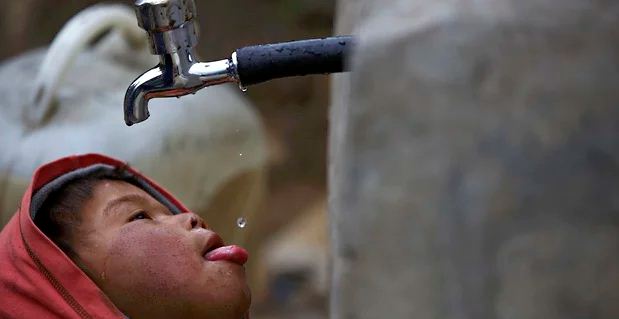Planet earth is a tremendous, life-sustaining biosphere inhabited by mankind. It is seen from outer space as a beautiful blue ball of life; however, millions of people across the globe lack access to clean drinking water and proper sanitation. The United States, Canada, and other prolific economies take clean water for granted, while the citizens of Somalia, Sudan and Nigeria suffer daily. If a planet is nearly three-quarters covered in water, then why are these countries so water poor? Awareness needs to be raised in the United States to prevent Americans from continuing their water wasting habits.
According to National Geographic, about 880 million people don’t possess access to clean water. Dysentery and cholera spread from consumption of contaminated water, causing roughly 5,000 children to die each day, while trachoma alone has blinded six million people (National Geographic, np). According to UNICEF, “the combination of malnutrition, dirty water and poor sanitation sets off a vicious cycle from which many children never recover.” (Manuel Fontaine, np) Families living in poverty are affected the most by a lack of access to clean water, because many of these people become and stay sick, and are forced to travel miles in order to obtain water, which prevents them from making money and going to school.
Africa is a perfect example of a location in which the water crisis has had the biggest impact. In northern Nigeria, 3.8 million people are left with no access to clean water due to infrastructural damage, and in Southern Sudan, 5.1 million people suffer from the same problem due to dry climate (Linda Stcyr, np). In Somalia, the number of people that are predicted to lack clean water in the next month has gone from 3.3 million to 4.5 million (Linda Stcyr, np). Since the turn of the new year, there have been over 13,000 reported cases of acute water diarrhea and cholera, which is almost five times more than last year (Linda Stcyr, np).The combination of dry climate, drought, and tribal conflicts have damaged the infrastructure of many African countries, causing water sources to become contaminated and spread diseases.
The struggle for water has greatly increased demand and depleted the worlds source of groundwater. Sustaining a nations economy is reliant on water supply for farming, rising population, and energy. The demand for water is very high due to its requirement for manufacturing, obtaining oil and gas, farming high-demand crops, and housing development. Agriculture takes up about 70% of the worlds supply of freshwater, and industries use about 22% (Lenntech, np). The major cities of the world are another proponent of the universal water issue. According to a 2014 study by the Nature Conservancy, cities use 504 billion liters of water daily, causing a major overuse of watersheds, a common water supply (Nature Conservancy, np).
Though there are many ideas for possible solutions to the water crisis, it is unlikely that any of these will have any effect in the near future; however, one effective solution that can take immediate action is raising awareness. The average American uses between 80 and 100 gallons of water per day (U.S. Department of Interior, np). The average swimming pool takes about 18,000 to 20,000 gallons of water to fill. While these statistics might seem irrelevant to Americans, they are quite obtrusive to a native of Mogadishu, Somalia or Abuja, Nigeria. Unfortunately it isn’t so easy to donate water to these countries, but something can be done morally. If the everyday American could cut back on how much water they use per day, and be more appreciative and thankful for their seemingly infinite access to clean water and proper sanitation, than the United States will have started a movement towards using less water, and raising awareness about those in Africa that are desperately struggling for water.
The overuse of this resource shouldn’t be considered unjust or unlawful in any way, but it can be a harmful issue when considering the water crisis in Africa. One way to reduce the amount of water the United States uses is to enact policies that put regulations on industries and agriculture, limiting them to how much water they can use. Higher costs on water and inputs that require water might cause industries and agricultural companies to use less water. In an economic sense, when costs are raised companies will aim to make profit by discovering new ways to produce just as much output while spending less on inputs. Corporations will always find ways to innovate if an input becomes more expensive. Many households also waste a significant amount of water each day, and though Americans have to pay water bills, it doesn’t seem to prevent them from continuing to waste water. Perhaps higher bills will reduce the amount of water that Americans use, and pave a path towards lower water use.
The economic goal is to use less water while being just as efficient. The first step is to develop a system of productive water use. Regulations must be placed on agriculture and industry, which combine to use more than 90% of earth’s water supply. A technique called drip irrigation can be implemented, which minimizes evaporation by allowing water to slowly drip to plant roots either from above or below the surface. Farmers also lack proper incentives to use water, so in order to reduce the amount of water that agriculture uses, farmers need to be motivated, whether its increasing costs or implementing new technology that will make them more money.
In order to raise awareness and incentivize American’s to use less water, the EPA and other environmental organizations must find a way to implement their message. The most successful way would be to post on social media, release television ads, and rent billboards. These platforms will reach out to each of the United States’ age groups, hopefully inspiring them to take action and help avoid worsening the ongoing water crisis. The problem with the United States is that most people aren’t concerned with what happens around the world, especially if the issue doesn’t effect them. For instance, Americans aren’t effected by the water shortages in Somalia, Sudan, or Nigeria because those countries lack any kind of relevance in the United States. If large, multi billion dollar television corporations, like NBC, aired emotional commercials portraying the struggles in those countries, then more Americans will be inspired to use less water.
The United States must reduce the amount of water that it uses because water is a limited resource, and if Americans aren’t cognizant, they will end up like the people in Nigeria, Somalia, or Sudan. Bogota, the capital city of Columbia, uses hydropower to provide 77% of Columbia’s electricity (GEF, np). The water needed for this task is extracted from the mountainous wetlands surrounding Bogota. The Global Environmental Facility has stepped in to preserve these wetlands by implementing the Special Climate Change Fund. The goal of this project is to reduce global warming effects, and sustain Bogota’s water source, which is predicted to become extremely scarce within the next 40 years (GEF, np). In order to avoid similar repercussions as Bogota, the United States has to make the necessary changes to reduce their exuberant use of water.
The Environmental Protection Agency has begun to help with the water crisis by implementing three projects: the Water Infrastructure Challenge, Building Sustainable Infrastructure, and Managing Sustainable Utilities. Each of these projects focus on sustainability of water infrastructure, water and energy efficiency, alternative technologies, pricing and finance, and asset management (U.S. Environmental Protection Agency, np). Given the proper funding, man power, and allocation of time and resources, these projects will be able to significantly reduce the amount of water that the United States uses.
Water is the most important resource in the world, providing uses for drinking, irrigation, hygiene and cooking. The issue of waters sustainability is growing every day, considering clean water is a necessity of life. In a developed nation, such as the United States, clean water might be the most available product, but in third world countries and developing nations, clean water that is both available and safe to drink is an extreme problem. Americans need to take action and reduce the amount of water they use before they become one of the many countries struggling due to a lack of clean and safe drinking water.
Work Cited
“Sustainable Water Infrastructure.” EPA, Environmental Protection Agency, 9 Feb. 2018, www.epa.gov/sustainable-water-infrastructure.
“Sustainable Earth: Water.” National Geographic, 7 Jan. 2014, www.nationalgeographic.com/environment/sustainable-earth/water/.
“Water Crisis – Learn About The Global Water Crisis.”
Water.org, water.org/our-impact/water-crisis/.
“Newsroom.” Global Environment Facility,
www.thegef.org/news/importance-water-sustainability.
“Water Treatment Solutions.” Lenntech Water Treatment & Purification, www.lenntech.com/water-food-agriculture.


